The Role of AI in Shaping the Future of Game Development
In this article, we’ll dive into the impact AI is having on the game development industry, the exciting trends it’s setting, and how developers at studios like FOGYX are using this technology to craft more dynamic and engaging gaming experiences.
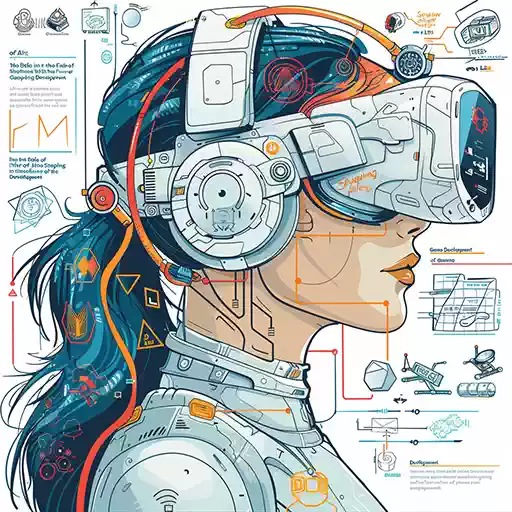
The Current Role of AI in Game Development
Before we jump into the future, it’s important to understand how AI is currently being utilized in game development. Although AI in gaming might sound futuristic, it’s been around for quite some time. The earliest use of AI in games dates back to classic arcade titles like Pac-Man, where simple algorithms dictated enemy behavior.1.1 Enhancing Non-Playable Characters (NPCs)
One of the most common applications of AI in games is in the behavior of non-playable characters (NPCs). These are the characters in a game that players don’t control, and AI dictates how they react to the player’s actions. In the early days, NPCs followed pre-determined paths or patterns, which often made them predictable.However, modern AI has taken NPC behavior to a new level. Today, AI-powered NPCs can analyze a player’s movements, adapt to their strategy, and make decisions that feel more human-like. Games like The Last of Us Part II and Red Dead Redemption 2 showcase how advanced AI can create enemies that think, hide, and attack in ways that feel incredibly lifelike. This shift in NPC behavior has made gameplay more challenging and immersive, as players can no longer rely on predictable enemy movements.
1.2 Procedural Content Generation
Another game-changing aspect of AI in development is procedural content generation. Imagine a world where every corner you turn in a game offers something new and unique, something that no other player may have experienced before. That’s the power of AI-driven procedural generation. In games like No Man’s Sky, entire planets, ecosystems, and creatures are generated algorithmically. This means players can explore nearly infinite worlds that were created dynamically, rather than being manually crafted by developers.This technique is a huge time-saver for game developers, allowing them to focus more on core gameplay and less on creating vast amounts of content manually. Plus, it offers players a fresh experience every time they play.
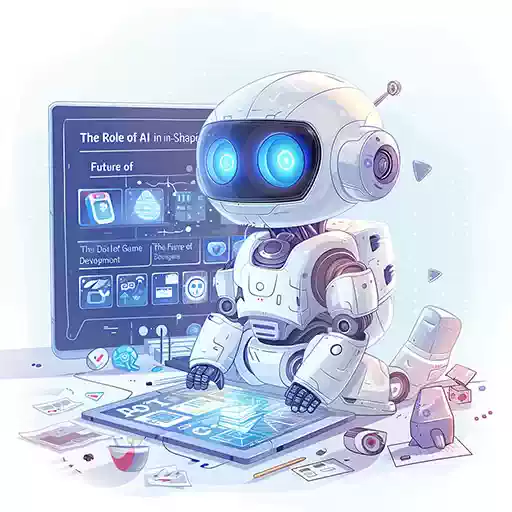
How AI is Shaping the Future of Game Development
Now that we’ve covered how AI is being used today, let’s take a look at how it’s shaping the future of game development. The potential applications of AI in this industry are vast, and as the technology becomes more sophisticated, it will open up new possibilities for both developers and players.2.1 AI-Powered Game Design Assistance
Designing a game from scratch is a daunting task. It requires creativity, technical knowledge, and a lot of time. However, AI-powered design tools are already starting to ease the burden on game developers. These tools can generate art assets, design levels, and even write storylines based on a developer’s input.For instance, AI can analyze successful game elements from previous titles and use that data to suggest new game mechanics or even design entire levels. Developers can then tweak these AI-generated designs to fit their vision, streamlining the creative process while still maintaining control. Think of it like having an AI co-pilot, assisting with repetitive tasks and allowing developers to focus more on innovation.
Automating the Creative Process Without Losing Human Touch
While AI can generate a lot of content, it’s essential to note that human creativity is still at the heart of game development. AI is more of a tool for amplifying human creativity than replacing it. Developers at studios like FOGYX can use AI to handle the time-consuming grunt work, like generating environments or testing mechanics, while they focus on creating engaging narratives, memorable characters, and exciting gameplay. It’s the perfect balance between human ingenuity and machine efficiency.
2.2 Personalizing Player Experiences
One of the most exciting prospects for AI in the future of game development is its ability to personalize gaming experiences. Imagine a game that adjusts to your playing style in real time, offering challenges that are perfectly suited to your skill level. With AI, this is no longer science fiction.AI algorithms can track a player’s behavior—how they play, the decisions they make, their skill level—and then use that data to adapt the game accordingly. If a player struggles with certain parts of the game, the AI can adjust the difficulty, providing hints or altering enemy behavior to make it more manageable. Conversely, if the player breezes through the game, AI can ramp up the difficulty, keeping the experience challenging and engaging.
Adaptive Storylines and Dynamic Game Worlds
AI can also be used to create dynamic storylines that evolve based on the player’s choices. Instead of following a fixed narrative path, games of the future may feature branching storylines that change with every decision you make. This allows for a deeper, more immersive gaming experience, where players truly feel like their actions have meaningful consequences. AI can also adjust game environments dynamically, such as altering weather patterns, enemy placements, or even the availability of resources based on the player’s actions.
2.3 AI-Driven Testing and Quality Assurance
Testing is a crucial aspect of game development, but it’s also incredibly time-consuming. Every mechanic, feature, and level needs to be tested multiple times to ensure there are no bugs or glitches. While human testers are essential, AI-driven testing is becoming increasingly important.AI can simulate countless playthroughs in a fraction of the time it would take human testers. It can spot bugs, identify areas where players might get stuck, and suggest improvements based on player behavior. This not only speeds up the development process but also ensures that the final product is polished and free of issues.
Predictive Analytics for Game Success
Beyond testing for bugs, AI can also be used to predict the success of a game. By analyzing market trends, player preferences, and data from previous releases, AI can help developers understand what elements of a game are likely to resonate with players. This can lead to more informed decisions during development, allowing studios like FOGYX to create games that are not only fun but also commercially successful.
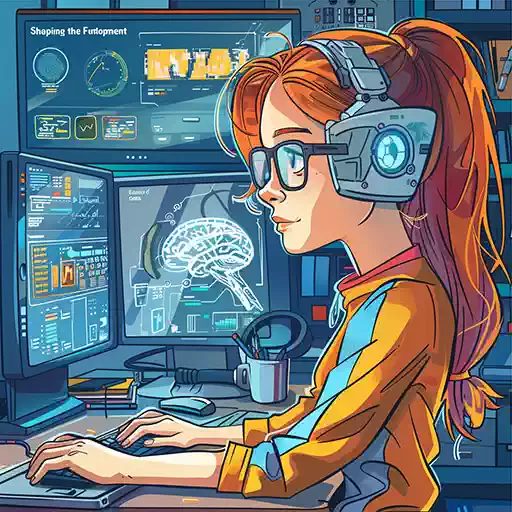
Ethical Considerations of AI in Gaming
As with any new technology, the rise of AI in gaming brings with it a set of ethical considerations. For instance, while AI-driven personalization can enhance a player’s experience, it also raises questions about data privacy. If AI is tracking player behavior to adjust gameplay, how is that data being used, and is it being stored securely?Additionally, there’s the concern of AI replacing human jobs in the game development industry. While AI tools can certainly speed up development processes, they also have the potential to reduce the need for certain roles, particularly in areas like testing and procedural content generation. It’s crucial for developers and industry leaders to strike a balance between embracing AI for efficiency and ensuring that the human touch in creativity remains irreplaceable.
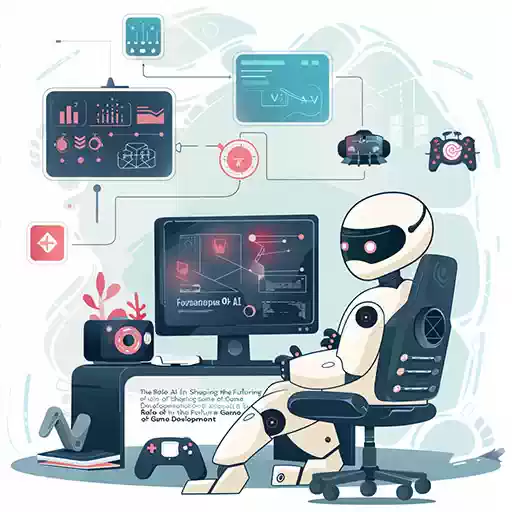
What the Future Holds for AI and Game Development
So, where do we go from here? The future of AI in game development is incredibly bright. As AI technology continues to advance, we’ll likely see even more sophisticated applications in the gaming world. From AI-generated storylines to games that can adapt to your emotions in real time, the possibilities are endless.3.1 AI in Virtual Reality and Augmented Reality
One exciting frontier for AI in gaming is its role in virtual reality (VR) and augmented reality (AR). AI can create more immersive VR and AR experiences by generating realistic NPCs that react to player movements or by building dynamic environments that feel more alive. Imagine stepping into a VR world where every interaction is unique because AI is shaping the environment in real time.3.2 The Rise of AI as a Game Designer
As AI becomes more advanced, we might even see AI-powered game designers in the future. These AI systems could generate entire games based on player preferences or developer input, pushing the boundaries of what’s possible in game design. While it’s unlikely that AI will completely replace human designers, it will certainly become a vital tool in the creative process.Conclusion: AI is the Future of Game Development
As we’ve explored, AI is already playing a pivotal role in game development, and its influence will only grow in the years to come. From improving NPC behavior to personalizing player experiences and streamlining the development process, AI is reshaping the way games are made. And for developers at studios like FOGYX, it’s an exciting time to be at the forefront of this technological revolution.AI isn’t just a tool—it’s a partner in creativity. By combining human ingenuity with AI’s efficiency and adaptability, the future of gaming promises to be more immersive, dynamic, and engaging than ever before. So, the next time you boot up a game, take a moment to appreciate the complex AI systems working behind the scenes, making your experience more thrilling and unique.
25 December 2024
More articles

In the modern gaming industry, developers have access to vast amounts of data that can be harnessed to improve the overall player experience. At FOGYX, we understand that creating a successful game goes beyond just beautiful graphics or engaging gameplay—it’s about continuously refining the player experience to ensure that each user feels connected, challenged, and entertained. The key to this refinement is data.

In today’s gaming world, the days of releasing a game and calling it “finished” are long gone. Players now expect their favorite titles to grow and evolve, not only with fresh content but also in response to their feedback. At FOGYX, we believe that listening to our players is essential to creating games that not only entertain but also continuously improve. Incorporating player feedback into our game updates ensures that we’re meeting the needs of our community while maintaining a dynamic and engaging experience.
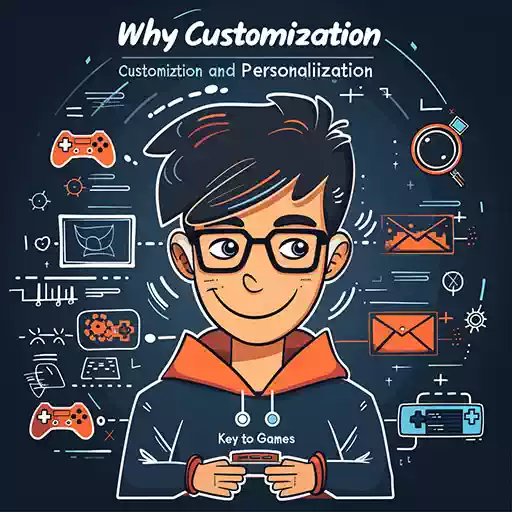
Imagine launching a game, and right off the bat, you get to design your own character—choosing every detail from their hairstyle to their armor color. You pick abilities, shape their journey, and even create a world that reflects your personal preferences. This isn’t just a trend; it’s the future of gaming. Customization and personalization have become key elements in modern game design, and they’re here to stay.
all articles
